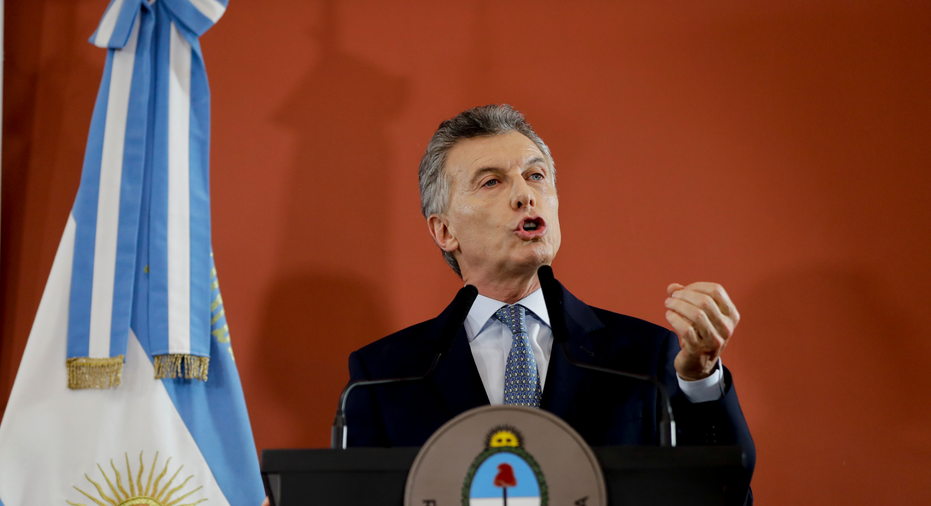Argentina peso slides after record loan with IMF
Argentina's President Mauricio Macri speaks from the government house in Buenos Aires, Argentina Thursday, Sept. 27, 2018. Argentina has been hit by a severe drought, one of the world's highest inflation rates and a sharp depreciation of its currency, which has lost more than half its value against the dollar so far this year. That has forced the government to reach out to the IMF for help. (AP Photo/Natacha Pisarenko)
BUENOS AIRES, Argentina – The Argentine peso slipped Thursday, a day after the government reached a revised $57.1 billion loan package with the International Monetary Fund that seeks to ease investor concerns over the country's ability to meet its debts amid an economic crisis.
Argentina has been hit by a sharp depreciation of the peso amid double-digit inflation, with the currency losing more than half of its value this year. The peso dipped Thursday, to close at 40.60 per U.S. dollar.
IMF Director Christine Lagarde said Wednesday that the lending institution had agreed to increase Argentina's credit line from $50 billion to $57.1 billion and speed up disbursements to help the country meets its challenges.
Lagarde also said Argentina's central bank agreed as part of the deal to intervene in currency markets only in case of extreme circumstances.
Under the revised agreement, the central bank will abandon inflation targeting and initially intervene only when the currency drops below 34 pesos or rises above 44 pesos per U.S. dollar. The band limits will rise 3 percent each month.
Some economic analysts and investors worry that monetary policy conditions imposed under the deal could cause more volatility to Argentina's weak economy.
Goldman Sachs Economist Alberto Ramos said the central bank "will abandon the current inflation targeting" and will aim for "zero growth of the monetary base" into the middle of next year.
"This will imply a very severe liquidity squeeze and monetary contraction in real terms with obvious adverse implications for activity," Ramos said.
Argentina has been affected by a severe drought that has hit crop yields in the key agricultural sector, and Argentines continue to lose purchasing power to an inflation rate that at about 40 percent annually is one of the highest in the world.
President Mauricio Macri said at a news conference Thursday that there are "tough months ahead" but that he is convinced "this is the only way."
Macri's government has announced new taxes on exports aimed at the government's budget deficit as part of its commitment with the IMF. Argentines staged a nationwide strike this week to protest austerity measures that include layoffs of thousands of state workers and the elimination of subsidies on utility bills and transportation.





















